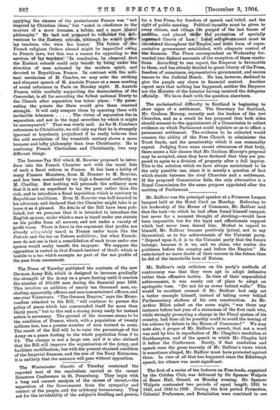Mr. Balfour's only criticism on his party's methods of controversy
was that they were apt to adopt defensive rather than offensive tactics. In view of their unparalleled achievements, it was surely out of place to adopt an apologetic tone. "Do not let us cower behind walls." This would be excellent counsel if Mr. Balfour had only set a better example himself, instead of taking cover behind Parliamentary shelters of his own construction. As Mr. Arthur Elliot asked on the same night, "was there any instance before last year of a statesman of the first rank who, while strongly promoting a change in the Fiscal system of his country, had done all he possibly could to avoid the testing of his scheme by debate in the House of Commons ?" We may note also, a propos of Mr. Balfour's speech, that not a word was said by him in repudiation of Mr. Chaplin's resolution at Southampton, and of the speech in which Mr. Chaplin laid it before the Conference. Surely, if that resolution and speech were the gross travesty of Mr. Balfour's views which is sometimes alleged, Mr. Balfour must have protested against them. In view of all that has happened since the Edinburgh speech, his silence was most significant.






































































 Previous page
Previous page